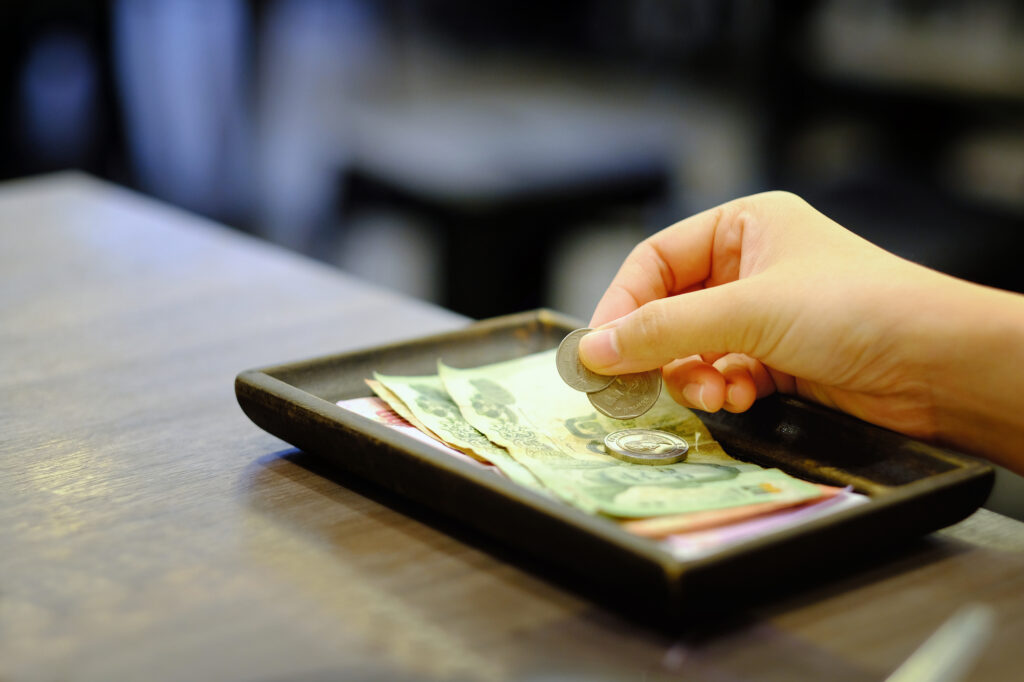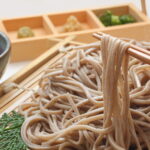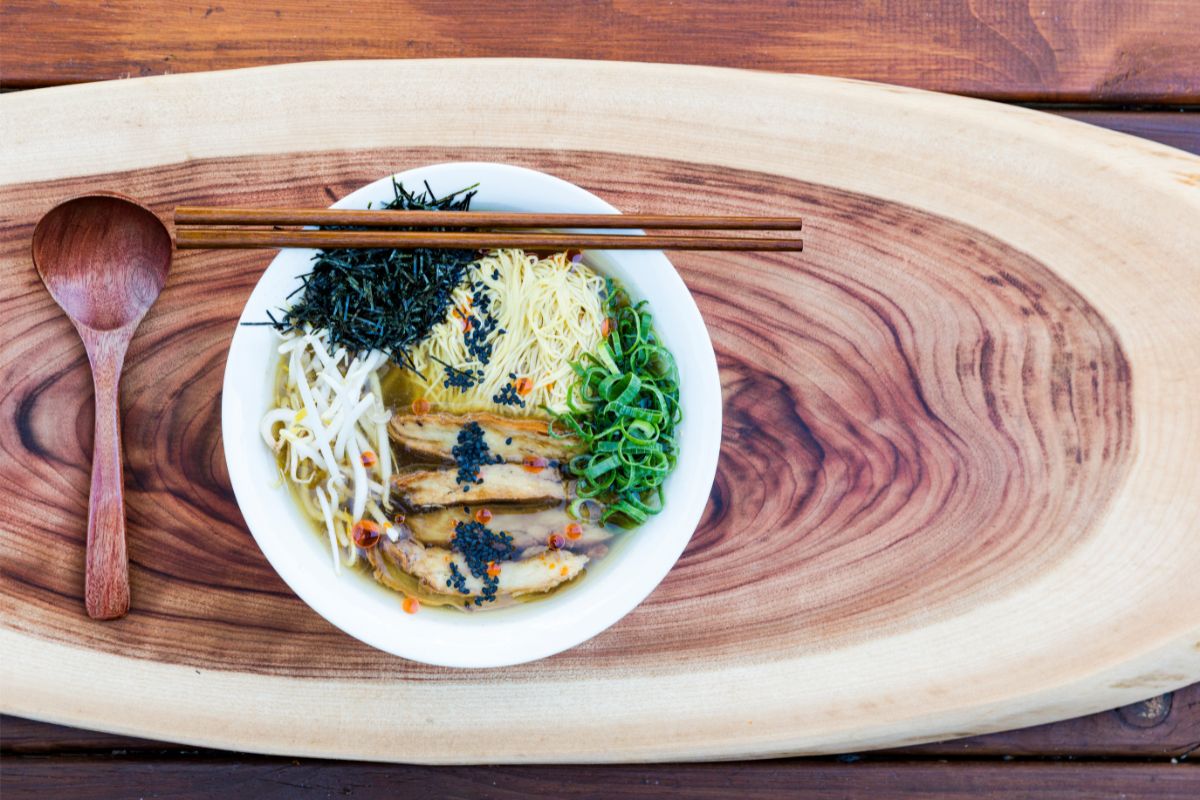Planning a visit to Japan? While your focus might be on developing an itinerary—including all the sights and experiences you want to explore—you should also spend some time getting to know the country’s unique rules of etiquette. Etiquette and respect are critical in Japan, and following the rules and customs enriches your experience and helps you show proper respect to your hosts.
You may already know the rules about removing your shoes or slurping noodles the right way. But, did you know that tipping isn’t the norm in Japanese culture? You’re not expected to tip wait staff and, in fact, persistently trying to tip can make people uncomfortable. It’s one of those Western cultural standards that simply doesn’t exist in Japan, and it takes many tourists a day or two to acclimate.
Read on to learn all you need to know about tipping culture in Japan, so you know when and how to tip when appropriate—and how to avoid etiquette mistakes when tipping isn’t applicable or accepted.

Tipping is common in Western culture
In most Western cultures, tipping is part of everyday etiquette. Whether you’re enjoying a delicious meal at a fine restaurant or benefitting from maid service at a hotel, tips are often accepted and expected by servicepeople. There are a variety of standards that determine when, how and how much you should tip. Needless to say, it’s a big part of culture.
While the amount you tip varies on the type of service you’ve received and the quality of that service, one thing is certain: failing to leave a tip is considered rude in many situations. The same is not true in other cultures, including Japanese culture, where servicepeople like wait staff, taxi drivers, maids and others don’t rely on tips for their income.
To understand why Japanese servicepeople don’t expect or want tips, it’s important to look at the cultural difference in work. Not only are Japanese service workers paid more than their Western counterparts, there’s also a culture of integrity among service workers in Japan. Where Western culture tips service staff for their hard work, in Japan, that hard work is implied and already compensated in their regular pay.
Tipping isn’t customary in Japan
Japanese service culture is much different than the one you’d find in other countries. Waiters, bartenders, hotel staff, drivers and many other servicepeople believe that part of their job is treating every patron with the utmost respect. They’re simply doing their job by going the extra mile, with no tip required. As a result, tipping isn’t normal.
At best, leaving a tip is seen as extra: a way for patrons to show appreciation above and beyond the call of duty. At worst, it can be offensive to service workers who believe they charge appropriately for their service. That said, there are some situations when service workers do appreciate tips. These are generally exceptions to the rule, however, and you won’t find too many Japanese service employees who expect to receive a tip.
When and when NOT to tip in Japan
While tourists should default to not tipping while in Japan, there are a few rare occasions where it’s appreciated or welcome. It’s important for tourists and new residents to understand when and where tipping is welcome in Japan, versus where it’s not necessary (or unwelcome). And, when it comes to tipping, there are certain forms of etiquette you need to follow to remain respectful.
Here’s a brief guideline to proper tipping culture in Japan, including where and where not to tip, how much and in what manner it’s appropriate to deliver the tip.
Should you tip wait staff in Japan?
In general, you don’t need to tip wait staff in Japan. Unlike in Western countries, where these service workers are paid a rate below minimum wage and are left to make up the rest in tips, Japanese wait staff are paid a fair salary. They do an excellent job serving, simply because it is their job.
The exception to this is when you meet a geisha, especially if you’re eating a private dinner with one. Geisha are expert hostesses, performing a wide range of functions during a private dinner. She may play music, dance or even teach you simple Japanese. It’s a performance art, and a tip is often expected (and welcome).
Should you tip hotel staff in Japan?
If you’re staying in a Western-style hotel, there’s no need to tip any of the staff, including maids. However, when staying at a traditional Japanese inn, or ryokan, tipping can be appropriate in some circumstances. At ryokans with personal attendants, like a nakai-san who serves you dinner, arranges your futons and accommodates your every need during your stay, it’s polite to tip.
To tip accordingly at a ryokan, prepare an envelope with 1,000 Japanese Yen—per person—to give to the nakai-san upon check-in. Make sure the envelope isn’t bent or tattered, and present it to them in both hands with a small bow. This is a customary way of showing your gratitude and is seen as a respectful way to deliver the tip. Never simply leave the tip on the counter or present cash!
Should you tip interpreters or tour guides in Japan?
While private guides and interpreters don’t expect tips, they’ll happily accept them. There’s no customary or recommended amount to give. Consider the number of days you’ve spent with them, or how much you enjoyed the overall experience, to determine an appropriate tip for your guide.
Tipping guides tends to be much more informal than tipping a geisha or nakai-san. It’s often acceptable to hand them folded cash directly; however, a slight bow is still seen as a respectful way to pass the tip from the giver to the recipient.
How to tip properly
There’s a right and wrong way to tip in Japan, just like there is in other cultures. In some situations—mainly informal ones like tipping an interpreter or guide—furnishing a tip in the form of cash is acceptable. Even still, it’s best to practice discretion and to bow as a way of showing respect. Remember, a tip shows appreciation—it’s only natural that a slight bow should follow.
In other situations, especially more traditional ones, there are simple rules of tipping etiquette you should follow. As described above, when visiting a ryokan, it’s customary to provide a tip for your nakai-san upon check-in. Deliver the tip in an envelope—it’s seen as crass to hand over a wad of cash in this traditional environment.
The same holds true when you’re attending a geisha ceremony, but there are even more rules of etiquette to follow. As your geisha pours drinks and leads a toast at the beginning of the meal, you’ll present an envelope with a tip. Make sure to hand the envelope to her with both hands and bow slightly to show respect. This is a long-standing tradition in Japanese culture, and it’s one you should follow to make the most of your experience.
How much should you tip?
In certain situations, like tipping interpreters or guides, you can determine the tip that’s appropriate to the level of service you’ve received. For example, if you’ve just finished a one-hour guided tour of a historical site, you might tip your guide 800 Yen. or, if you’ve hired an interpreter and translator for a several day period, you might choose to present them with a tip of 3,000-5,000 Yen, depending on how much time they spent with you.
When staying at a ryokan, you should tip your nakai-san 1,000 Yen per person. When having dinner with a geisha, tip around 3,000 Yen per person. Keep in mind that these are generalizations and, as is the case in Western culture, the size of the tip you offer is equivalent to your level of appreciation for the services rendered (within reason).
Tipping too much can also be a point of contention in Japan. If you’re overzealous with your tip, you may make someone feel as though they didn’t live up to the standards you’re rewarding them for. Too big of a tip puts them in an imposition—they’ll feel rude giving you money back and uncomfortable keeping it. To avoid this, it’s best to tip conservatively, if at all.
Tipping has its place in Japanese culture
While tipping isn’t as widespread in Japan as it is in most other countries, there are still some situations where the practice is appropriate and even encouraged. Whether you’re enjoying the services of the wait staff at a traditional Japanese ryokan, eating dinner with a geisha or traveling with an interpreter, tipping your service provider is accepted and appreciated in the right circumstances.
If you’re someone who’s used to tipping all wait staff, it might take a day or two for you to break the habit in Japan. Remember, you’re not doing someone a disservice by not tipping them. And, in situations where tipping is normal, it’s less about the money and more about the gesture.
Keep these simple rules of tipping etiquette in mind on your journey and enjoy the incredible hospitality of Japanese culture without the pressure that comes from trying to figure out what to tip.
- How Much Money Can You Make Teaching English in Japan? - December 12, 2022
- The Best Places to Teach English in Japan - December 9, 2022
- The Best Credentials for Teaching English in Japan - December 8, 2022








